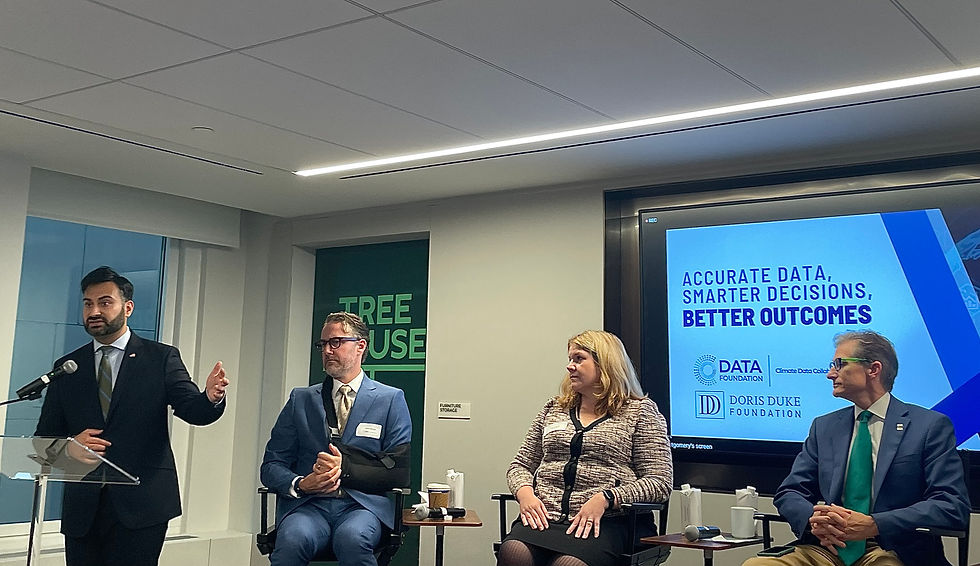New York Climate Week lookback and learnings
- Oct 22, 2024
- 3 min read
September’s Climate Week in New York was packed this year, with over 900 listed events and countless private gatherings. Even so, in the events Cascade attended, a few common themes arose.

One big theme clearly shone through.
New York Climate Week is growing up
Climate is no longer a niche issue. Companies aren’t merely reporting their emissions data, they are making portfolio decisions based on reducing their carbon footprint. Data isn’t just a nice-to-have; instead, customers are demanding specific and better data to help them make their own emissions-reduction decisions. This evolution was evident at this year's New York Climate Week, which started as a quasi-protest event in 2009 and has now gone fully mainstream.
Let’s dig a little deeper.
“Old economy” companies are the new climate investors
There's a shift in who is investing in climate – at least anecdotally. Venture capital investment in climate tech is down year on year, while large investment banks like BlackRock are walking back their climate commitments. (Despite these numbers, the investor presence at Climate Week was more noticeable than ever.) In the meantime, “old economy” sectors like manufacturing and natural resources are making big investments to decarbonize. They are feeling the pressure from new regulations in places like the European Union (EU) and California. They also face demands from their customers, who are preparing for these same regulations, and racing to deliver.
Corporate reporting goes professional
Corporate sustainability reporting has traditionally relied on sustainability departments chasing down data and metrics from internal teams, often on ad hoc, best-available spreadsheets. That data is then standardized for the corporate sustainability report and shoehorned into other reporting questionnaires like CDP or the Dow Jones Sustainability Indices (DJSI)--often themselves on outdated, hard-to-use platforms.
With governmental reporting requirements coming into effect in multiple countries, and the EU Corporate Sustainability Due Diligence Directive requiring due diligence in addition to reporting, creaky sustainability reporting systems are reaching their breaking point. The sustainability function has to be professionalized and systematized. People we talked to in New York were overwhelmed by the coming reporting requirements and are in various stages of moving to a much more automated, robust, controller-like function.
Not just more data – the right data
Data companies were everywhere during Climate Week. Remote sensing, AI and big data analytics offerings, data aggregators, ESG data providers, you name it. On the one hand, this makes sense: companies need data to assess their performance and to report out to stakeholders. Yet many of the conversations Cascade took part in involved sifting through all the available information to find the right stuff. Data has to be decision-useful, trustworthy, and replicable year after year. That’s a tall order.

AI to the rescue for climate?
Climate Week has always been a draw for companies, NGOs, and governmental organizations with new ideas to tackle climate change. Energy was big, as it always is and should be (Geothermal House wins Cascade’s award for best commitment to their theme). Unlike past years, though, cloud computing and artificial intelligence had an outsized presence, and they speak to the speed with which we may see new developments in climate solutions. Organizations presented computer technology-based solutions for everything from energy, utilities, and infrastructure to logistics and supply chain, from agriculture and natural resources to the built environment. (Check out the Climate AI Market map unveiled during Climate Week for a taste). These cloud and AI companies are competing to secure enough clean energy to power their computing needs so they don’t become a climate problem instead of a climate solution.
Communications is queen
The complexities of reducing emissions – not to mention all that data! – mean that talking about climate issues and climate solutions is hard. Storytelling was mentioned again and again as an under-resourced part of climate mitigation efforts. Organizations noted effective communications can increase customer and investor understanding of their strategies and reduce accusations of greenwashing.
Still room for serendipity
Climate Week is very professionally produced now. It attracts big names and offers a variety of high-profile evening galas. Yet there’s still room for whimsy. At an event at Regen House, we encountered reception attendees abuzz about the giant (human) Cheez-It they encountered, while we walked away from the Axios event holding hand-packed jars of honey from Maker’s Mark’s new beehives.



Comments